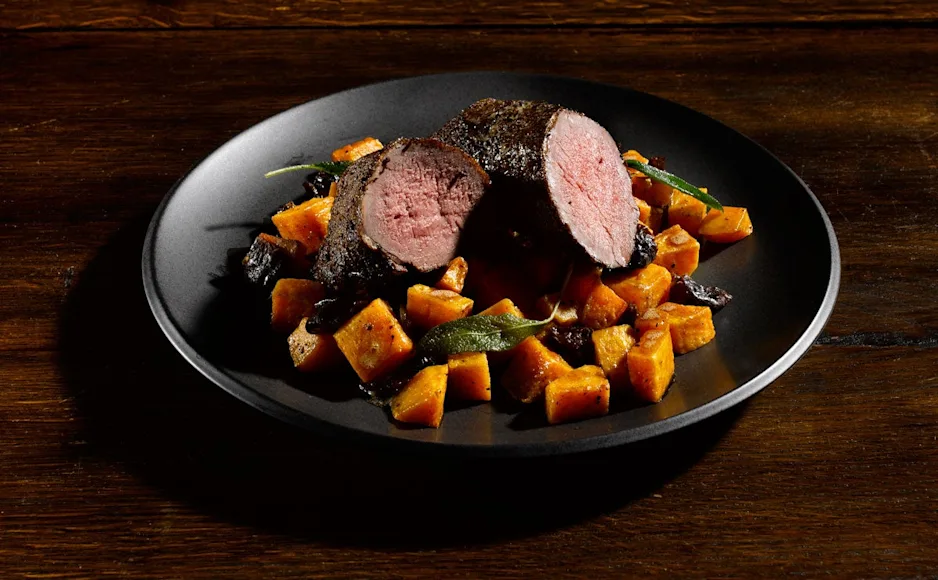When it comes to hunters’s favorite cut of venison, backstraps get a lot of the attention—and rightly so; they are delicious. But it’s hard to beat a venison tenderloin. For many hunters, the tenderloin is one of the first things they’ll cook and eat off their newly-tagged deer. The small cuts
, which lie underneath the spine and between the ribs and pelvis, lend themselves to a satisfying celebratory meal: They cook quickly and easily and, because they’re naturally tender, they taste great. As with a venison backstrap recipe
, you really don’t need much more than salt and pepper for a tasty tenderloin. But in case you’re feeling a little more ambitious, or just want to try something new, here is possibly the best recipe for venison tenderloins that we’ve ever tasted.
Our Go-To Recipe for Venison Tenderloins
Ingredients
Kosher salt
Freshly ground black pepper
1⁄2 tsp. ground allspice
1⁄4 tsp. ground star anise
1⁄4 tsp. cinnamon
1⁄4 cup, plus 2 Tbsp., canola oil
4 venison tenderloins, 6-7 oz. each
1⁄4 cup (packed) prunes, chopped in 1⁄4-inch pieces
2 Tbsp. Armagnac (optional)
12 Tbsp. unsalted butter, softened at room temperature, cut in tablespoon-size pieces
2 cups peeled cheese pumpkin, cut in 1⁄4-inch dice
10 sage leaves, minced
How to Cook Venison Tenderloins
In a bowl, stir together 11⁄2 tsp. salt, 1⁄2 tsp. pepper, allspice, star anise, and cinnamon. Whisk in 2 Tbsp. of oil. Rub mixture on both sides of each venison loin.
Put prunes in a bowl. If using Armagnac, pour over prunes and set aside to soak.
Heat 2 Tbsp. of oil and 2 Tbsp. of butter in 10-inch saute pan over medium heat. Add pumpkin and cook, tossing and stirring every few minutes, until lightly caramelized on all sides, 15 to 18 minutes. Toss in prunes. Remove pan from heat and season with salt and four grinds of pepper, or to taste.
Preheat oven to 350 degrees. Put 2 Tbsp. each of the oil and butter in a 12-inch ovenproof saute pan over medium-high heat. When butter starts to sizzle and foam, add venison loins and sear for 1 minute. Turn them over and transfer pan to oven. Roast until an instant-read thermometer inserted to the center of loin reads 120 degrees for rare. Remove pan from oven and let venison rest on a clean, dry surface for 3 to 4 minutes.
Meanwhile, heat a saute pan over medium-high heat. Add remaining butter and cook until it melts and turns brown, approximately 1 minute. Remove pan from heat and stir in sage leaves. When sage leaves get crispy, set aside.
To serve, divide pumpkin and prunes evenly around four plates. Top each portion with a venison loin, a drizzle of brown butter, and crisped sage.
**Read Next: What Is Venison?
**
How to Pan-Fry Venison Tenderloins
A venison medallion is a 1⁄2- to 3⁄4-inch slice of backstrap or tenderloin cut before or after cooking. Panfrying one perfectly every time takes practice. Here’s how to get that delicious crust and medium-rare center:
It’s hard to cook an ice-cold medallion properly. Salt your meat and let it come to room temperature for at least 15 minutes. Pat the meat dry before heating it–wet meat doesn’t sear.
Cook whole backstrap of smaller deer. This makes it easier to get it to medium-rare. Small ones pre-cut into medallions will overcook.
The thicker the medallion, the lower the heat. Never cook whole loin pieces on high heat for more than a few minutes. I cook pre-sliced medallions on medium heat to get the crust-and-medium-rare combination.
Don’t mess with it. Let the loin cook in one spot for a while before turning, and turn only once.
Let it rest inside a foil tent for 10 to 15 minutes. This helps the venison stay juicy.






